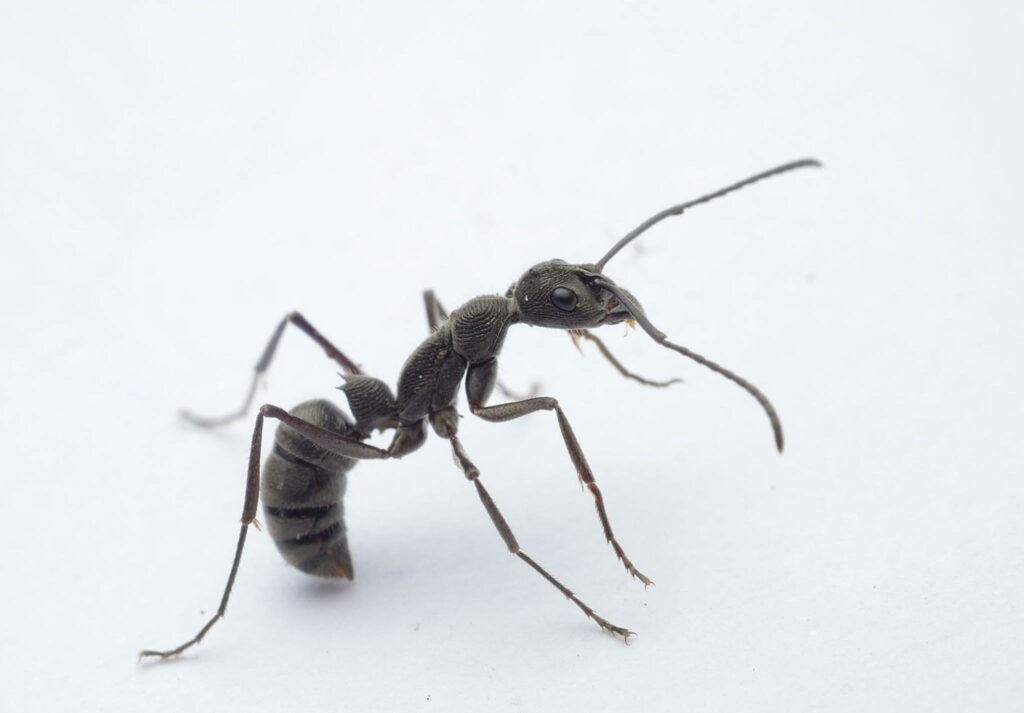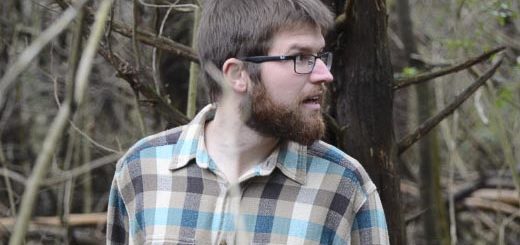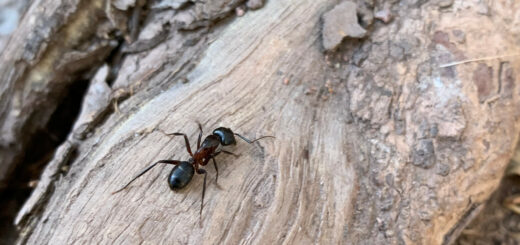Ants modify their behaviour to transport additional brood during colony relocation


In the recent article “Adult-brood ratio causes behavioural modifications to maintain transport performance during colony relocation in the Ponerine ant Diacamma indicum (Hymenoptera: Formicidae)” published in Myrmecologial News, Purbayan Ghosh and Sumana Annagiri assessed how brood transport during colony relocation can affect colony-level and individual-level organization. In manipulative experiments using the ant D. indicum, the colonies had either brood or no brood to transport. Colonies with brood had a lower probability of relocating, but they could adjust their behaviour to transport this additional brood seamlessly. Overall, this ability will likely give these superorganisms an advantage when they occupy new territories, enhancing their survivability and reproduction. Here, Purbayan Ghosh and Sumana Annagiri answer a few questions about their study.
Featured image: Diacamma indicum gamergate. Photo by Manoj Vembayam, retrieved from AntWiki.
An Interview compiled and edited by Alice Laciny, Patrick Krapf, and Phil Hoenle

MNB: Could you tell us a bit about yourself?
PG: My name is Purbayan Ghosh, and I am from India. I was a master’s student at the ant lab Indian Institute of Science Education and Research Kolkata during this study. I have been fascinated by nature and wildlife from a very early age, thus studying my neighbourhood animals was always my favourite hobby. After I joined the ant lab in my first year of undergraduate, I got to do what I always loved: Observing ant colonies, but now scientifically. In particular, I was flabbergasted by the complex processes behind the individual and collective decision-making during ant colony relocation. Thus, I decided to understand this process in different ant species across different ecological conditions. Currently, I am working to understand complex decision-making processes during colony emigration of Temnothorax rugatulus as part of my Ph.D. at the Social Insect Research Group, Arizona State University.
SA: I’m a Behavioural Biologist currently focusing on the nesting biology of ants. I am a Professor in the Department of Biological Sciences at the Indian Institute of Science Education and Research Kolkata. In addition to researching the life of a fascinating ant that lives in our vicinity together with my students, I teach Evolution, Ecology, and Behaviour to both undergraduates and postgraduates.
MNB: Could you briefly outline the research you published in Myrmecol. News in layman’s terms?
PG & SA: How do you manage extra luggage? Extra luggage that is delicate and precious when you are on the move. This is the question we asked a colony of ants. Among social insects, only ant colonies are known to transport their brood with them when they relocate to a new nest, i.e., move from an old nest to a new one. Other social insects such as bees and wasps, on the other hand, abandon their brood during relocation and consequently have reduced fitness. Brood consists of eggs, larvae, and pupae, and represents the next generation of the colony. This brood-carrying behaviour allows ants to retain their investment into the next generation and hence have an adaptive advantage.
We examined if the ants relocate under different adult-brood ratios and if so, how do they adjust their collective behaviour to accommodate the extra brood, i.e., “luggage”? We used a ponerine ant species, Diacamma indicum, as a model system and found that not all colonies were able to relocate under an increased brood-to-adult ratio. Several colonies with increased brood ratio choose not to relocate, even if they were in a vulnerable state and were aware of a new nest. However, if a colony relocated, they did it without any major compromise in their performance in terms of time or efficiency. Interestingly, brood-depleted colonies did not gain any advantages during transportation, as their efficiency was similar to control colonies. The key to maintaining transport efficiency was the ant’s ability to flexibly modify their behaviour.
MNB: What is the take-home message of your work?
PG & SA: These ants have seamlessly incorporated brood transport into their tandem running recruitment process while relocating to a new nest. Tandem running is a recruitment process in which an informed individual (termed leader) invites one of her nestmates to follow her to a destination while maintaining physical contact along the journey. Colonies respond by flexibly modifying their behaviour to coupled adult-brood transport in the presence of brood and thus avoid paying additional costs in terms of time to transport.
MNB: What was your motivation for this study?
PG & SA: We were impressed by how ant colonies perform brood transport. It is particularly interesting to watch tandem pairs transporting pupae across a heterogeneous terrain in their natural habitat. Even though brood transport is a very important component of ant life history, previous research has been very sparse. Thus, we decided to take up this question. In our first step in that direction, we contrasted the relocation dynamics across control (normal colonies), brood-depleted colonies (all the brood of the colony was removed), and brood-increased colonies (additional brood was added to the colony).
MNB: What was the biggest obstacle you had to overcome in this project?
PG & SA: Getting the additional brood for the colonies was a big challenge. Since this species is not typically cultured in the lab, we needed to collect a large number of colonies from their natural habitat for the additional brood. This meant we were dependent on seasonal variation and a lot of hard work.
MNB: Do you have any tips for others who are interested in doing related research?
PG & SA: It’s a wonderful experience to watch organisms in their natural habitat. Observing them has always brought up extremely interesting questions. The current study emerged from one such question. Curiosity, a lot of patience, and a wish to think about the processes are the essential elements required to conduct this kind of research.
MNB: Where do you see the future for this particular field of ant research?
PG & SA: With this study, we want to highlight the importance of studying the brood transport process in ants. It is essential to study this process across different species of ants and different recruitment methods. For the next step, it will be essential to measure the adaptive advantages that brood transportation brings to ants as compared to other social insects. We hypothesize that brood transportation will give ants major benefits in several different contexts, like the colonization of new territories, avoiding parasites and predators, in addition to giving them the option to live close to resources.






Recent Comments